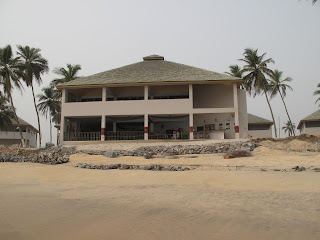As most people already know, I contracted malaria during the last couple weeks. Based on my symptoms, I have been exhibiting symptoms of malaria for the last three weeks without seeking treatment. In keeping with my uncanny ability to contract illnesses in a very unconventional way, I did not have a fever or vomiting, two of the most common symptoms of malaria. I was however, very exhausted and had a constant headache. Neither of these symptoms were alarming for me because I had been traveling for a month for my Christmas holidays. So I thought I had a cold and rested as much as possible and didn’t think much of it.
My second week back at work after my holidays I really struggled to get out of bed in the mornings. Instead of arriving at work shortly after 9am, I was now arriving after 10am and truly failing at accomplishing anything because I couldn’t keep a thought in my head for more than a few seconds. My doctor in Canada gave me a course of antibiotics to take in case I suspected I had an infection or something so I decided to take them and see if it improved my symptoms. I also resumed taking my iron supplements as I suspected that I was once again anemic because I know I am not getting enough iron from diet alone. The antibiotics seemed to help somewhat and I felt a bit more energetic for a few days.
Last Wednesday night, I was once again feeling worse and my wonderful American friends convinced me that it was time to go see a doctor. From a suggestion from a fellow Canadian volunteer, I went to the small clinic at the A&C Mall in East Legon. I was surprised at how clean and quiet the clinic was. It was comparable to any other clinic I’ve been to in Canada. The biggest difference was that I didn’t have to provide any identification or health insurance. I simply filled out a small form and waited to see the doctor. The doctor recommended a blood test for malaria which was done in the clinic by a nurse. It did freak me out that the nurse didn’t wear gloves while pricking my finger. Apparently this isn’t uncommon in Ghana but it was certainly uncommon for me! The results came back that I did have malaria so I was prescribed a three day course of anti-malarials and told to go home and rest. In total, the doctor and blood test cost me 26 cedi ($17), and the pills cost me 10 cedi ($6.60).
It freaked me out that the pills made all my symptoms worse instead of better. By Sunday, when I had completed the medication, I was feeling pretty awful. I knew beforehand that taking my daily doxycycline would suppress my symptoms if I contracted malaria but I wasn’t expecting to be as uncomfortable as I was while taking the medication. I was unable to regulate my body temperature so I would be freezing cold but sweating profusely. My appetite wasn’t great and I felt weak and sore. I finally got the fever however I wasn't vomiting as I was expecting. I am grateful to have good friends who checked in on me to make sure I was alright.
I decided to go back to the doctor on Tuesday because I was still feeling unwell and wasn’t convinced that the malaria was gone. To me, a three day course of antibiotics isn’t enough to cure the ailment however that seems to be the magic number here. I had another malaria test which came back negative (yay!) and my iron levels were only slightly low. Basically I just needed to rest and start trying to resume a normal schedule. I am still having pretty low energy levels however I am hopeful that I will be feeling my normal self by next week. The heat is absolutely contributing to my slow recovery.
For the record, the common symptoms of malaria are:
- fever
- headache
- nausea
- vomiting diarea
- sweating/chills
- muscle aches and pains
The best ways to prevent malaria are to take prophylaxis medication, sleep with a bed net, wearing bus spray and most importantly wearing long pants when the mosquitos are out (dusk-early evening). If in doubt, go see a doctor. I hate going to doctors as a general rule however having a friend take me for moral support was helpful.
Finally, take the advice available on the internet with a grain of salt, I found some useful information but mostly I got increasingly freaked out by the horror stories of people with severe malaria.













